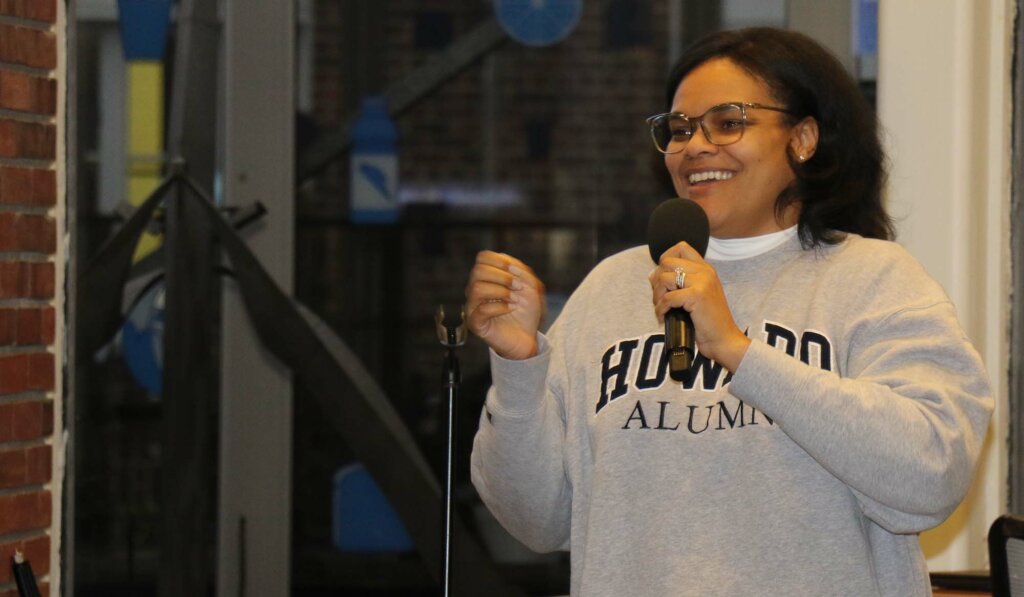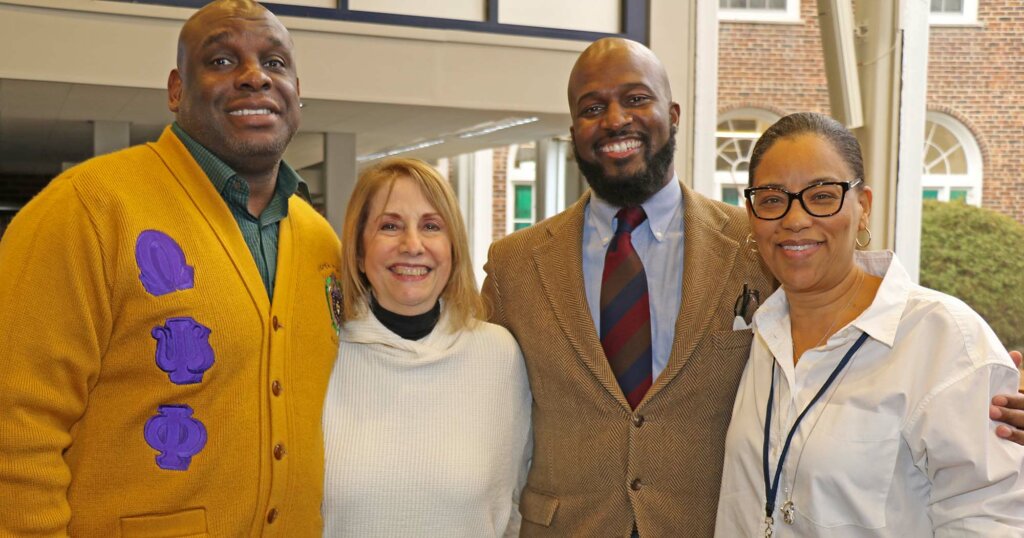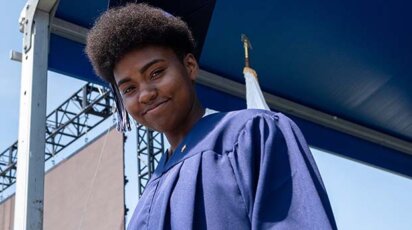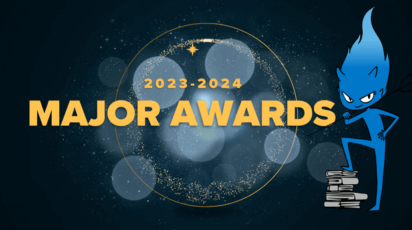News
First HBCU Alumni Student Mixer

Librarian Iman Stultz, proudly wearing her Howard University alumni sweatshirt, called attending Howard, “a once in a lifetime experience” that she wanted to share with the students at Poly’s HBCU (Historically Black Colleges and Universities) Alumni Student Mixer.
The Benefits of a HBCU Education
Stultz had invited Upper School students, parents, alumni, staff, and eighth graders to participate in the first HBCU Alumni Student Mixer on March 3. After a game of HBCU Bingo to break the ice, the event began with a short video about the advantages of attending predominantly Black colleges, noting there are over 100 HBCUs in 19 states.
“Our goal is to model the value of HBCUs through a familial lens, highlighting the professional successes achievable with an HBCU education, and to provide families with tools that can help inform their decision-making.”
Iman Stultz
HBCU Panelists
A panel including Upper School Dean Alex Carter, Roland Merchant P’29, and Runako Gulstone ’04 described their own experiences at HBCUs, including Alabama State University, Dillard University, and Howard Law respectively. All three agreed that attending an HBCU had been a formative experience in their lives.
Carter said that even though he lived in Washington, D.C., he decided not to go to Howard, but instead to Alabama State University, where he could play Division I sports.
Merchant went to a prep school in California, similar to Poly. But going to Dillard University in New Orleans was a “home away from home,” he said, that “may be unique to the Black college experience.”
Gulstone said that he went to see Howard University for himself and adamantly told his college counselor this is where he wanted to go to college.
Stultz advised students to think about what they want out of college. Merchant told them they will make lifelong friendships at an HBCU.
Stultz asked what narratives about HBCUs the panelists would disrupt. HBCUs are more than the Homecoming clip that was shown in the introductory video, offered Carter. They discussed why more Poly students don’t apply to HBCUs. Merchant advised parents and students when choosing a university, “Make sure it is the right college and experience for the student.”
“Education was a value of my family,” Gulstone added. But college has become a “luxury,” he said.
Carter said that the “first teacher who saw value in me” was a history teacher at Alabama State University. “Everywhere else I would have been just another student.”
Merchant added, “It is the confidence you get” at a HBCU. And others described their college as a “home.”
Gulstone said that Howard had “revolutionized my life.” He added that Howard’s location in Washington, D.C. came with an added benefit of being able to take courses at a “consortium of universities.”
The next presenter was Ebony Tyler, founder of Liberated Success, who takes students on HBCU tours and more. According to their website, Libterated Success focuses on “the needs of Black students, families, and educators. Through workforce development, intentional career exploration activities, college experiences, and counseling support, young adults…” Tyler emphasized, “I want students to get a deeper understanding of what an HBCU is.” She added that there are strategies to get money to afford college.

Guide to the College Process Specifically Geared for Black Families
Poly’s Director of DEIB Department Erika Freeman P’24, ’26, ’28, ’32, introduced Shereem Herndon-Brown and Timothy L. Fields, authors of The Black Family’s Guide to College Admissions. Herndon-Brown is founder and Chief Education Officer of Strategic Admissions Advice, an educational consulting company specializing in college counseling curriculum. Fields has spent 25 years in education, mostly in enrollment management, currently at Emory University. The focus of their book is to help Black families understand the college process. Before talking about the book, Herndon-Brown began by acknowledging the great influence that former Poly English teacher Gail Karpf had on his life. She taught him in second and third grade at Brooklyn Friends. “She said that I would be a writer,” Herndon-Brown said smiling and obviously, she was right.
Herndon-Brown said he became aware that in college counseling, Black students were being “under-matched” to colleges. The students were being told not to be “too ambitious.” He saw the need for a book with a different voice “for Black people in the college process.” Fields explained that the authors had done their research during COVID by talking via Zoom to 200 counselors “to understand how HBCUs were different.” They covered areas of costs, location, opportunities, majors, and cultural diversity. Fields, Senior Associate Dean in Undergraduate Admission at Emory University, shared his experience in trying to balance the student’s goals with the ambitions of parents.
Travel Abroad
Attendees also briefly heard from Shomari Maynard of CIEE, the Council on International Educational Exchange, described as, “the country’s oldest and largest nonprofit study abroad and intercultural exchange organization, serving more than 400 U.S. colleges and universities, 1,000 U.S. high schools, and 35,000 international exchange students each year.
Poly student MaKiyah Turner-Hicks ’24 talked about going to Berlin last summer on a CIEE Global Navigator Scholarship, the largest study abroad scholarship fund for high school students in the U.S. She learned to navigate the city on her own and this coming summer she will be going to Rome.
Afterward the panelists had some time to chat with parents and students and for Herndon-Brown and Fields to sign their book.




